2019-2020学年人教版PEP六年级英语下学期全册单元知识点复习资料
新人教版小学英语六年级下册各单元重点考点总结
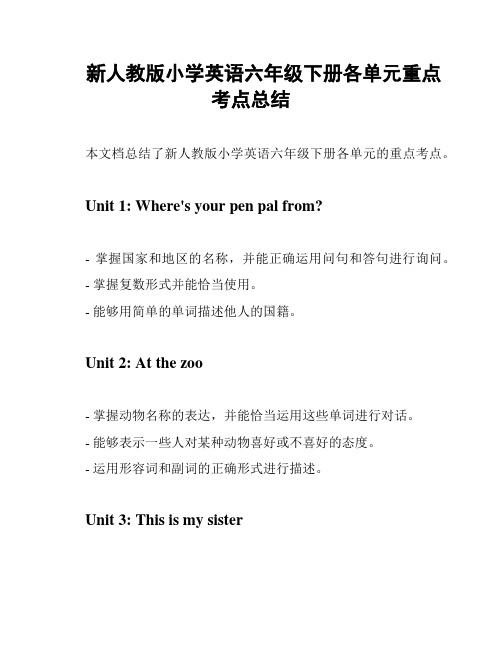
新人教版小学英语六年级下册各单元重点考点总结本文档总结了新人教版小学英语六年级下册各单元的重点考点。
Unit 1: Where's your pen pal from?- 掌握国家和地区的名称,并能正确运用问句和答句进行询问。
- 掌握复数形式并能恰当使用。
- 能够用简单的单词描述他人的国籍。
Unit 2: At the zoo- 掌握动物名称的表达,并能恰当运用这些单词进行对话。
- 能够表示一些人对某种动物喜好或不喜好的态度。
- 运用形容词和副词的正确形式进行描述。
Unit 3: This is my sister- 掌握表示家庭成员关系的词汇,并能在合适的情境下熟练使用。
- 能够用简单的句子表达自己和他人的家庭成员状况。
- 掌握疑问句和肯定/否定回答的语法结构。
Unit 4:What do you usually do on weekend?- 掌握表示日常活动和娱乐爱好的名词和动词,并能在合适的情境下熟练使用。
- 能够描述周末的计划,并能够用适当的时态表达过去、现在和未来的时间。
- 学会以礼貌的方式询问和回答他人的问题。
Unit 5: What's the matter?- 能够描述自己的身体不适,并能运用一些常用的疾病词汇。
- 掌握表示询问、建议和回答的用语,并能在合适的情境下使用。
- 学会表示关心和病愈等祝福的表达方式。
Unit 6: It's raining- 学会用简单的句子描述天气情况,并能表达对不同天气的态度。
- 掌握天气形容词的表达方式。
- 能够描述不同季节的气温、天气和风景。
总之,在学习小学英语六年级下册的过程中,应注重关注以上重点考点,并在实际中多进行运用练习,以此提高英语水平。
人教版pep六年级下册知识点

人教版pep六年级下册知识点PEP(Primary English Program)是指小学英语教学计划,人教版是指由人民教育出版社(People's Education Press)出版的版本。
下面是人教版PEP六年级下册的英语知识点总结:Unit 1: Seasons and Weather(季节和天气)- 学生将学会用英语表达不同季节和天气的词汇,例如:spring (春天)、summer(夏天)、autumn(秋天)、winter(冬天)等。
- 学生将学会描述天气状况,例如:It's sunny(阳光明媚)、It's rainy(下雨了)等。
Unit 2: Healthy Eating(健康饮食)- 学生将学会用英语表达一些食物的名称,例如:fruits(水果)、vegetables(蔬菜)、meat(肉类)等。
- 学生将学会表达自己的饮食偏好,例如:I like apples(我喜欢苹果)等。
Unit 3: Daily Routines(日常生活)- 学生将学会用英语表达一天中的不同活动,例如:get up(起床)、have breakfast(吃早餐)、go to school(去学校)等。
- 学生将学会描述自己和他人的日常活动,例如:She brushes her teeth(她刷牙)等。
Unit 4: Hobbies(爱好)- 学生将学会用英语表达各种爱好,例如:swimming(游泳)、drawing(画画)、singing(唱歌)等。
- 学生将学会描述自己和他人的兴趣爱好,例如:I like playing football(我喜欢踢足球)等。
Unit 5: At the Farm(在农场)- 学生将学会用英语表达与农场相关的词汇,例如:cow(奶牛)、pig(猪)、chicken(鸡)等。
- 学生将学会描述农场中的动物和活动,例如:I feed the chickens(我喂鸡)等。
pep六年级下册知识点归纳总结

pep六年级下册知识点归纳总结PEP(人教版小学英语)六年级下册是小学英语学习的最后一个学期,知识点相对较多,需要系统性的总结和归纳。
本文旨在对PEP六年级下册的知识点进行归纳总结,以帮助学生复习和掌握这些重要的知识内容。
一、单词和词组1. 数字:数数词、序数词(1-100)例:one, two, three, four, five, six, seven, eight, nine, ten, eleven, twelve, thirteen, fourteen, fifteen, sixteen, seventeen, eighteen, nineteen, twenty, thirty, forty, fifty, sixty, seventy, eighty, ninety, one hundred;first, second, third, fourth, fifth, sixth, seventh, eighth, ninth, tenth2. 时间词:days of the week, months of the year例:Monday, Tuesday, Wednesday, Thursday, Friday, Saturday, Sunday;January, February, March, April, May, June, July, August, September, October, November, December3. 季节和天气:seasons and weather例:spring, summer, autumn, winter;sunny, cloudy, rainy, windy, snowy4. 学科词汇:subject words例:Chinese, English, math, science, art, music, P.E.5. 学校用品:school supplies例:desk, chair, book, pencil, pen, ruler, eraser, backpack6. 动作动词:action verbs例:run, walk, jump, skip, swim, dance, sing, read, write, draw, paint7. 食物:food例:apple, banana, orange, cake, bread, milk, juice, water, rice, noodles8. 喜好:likes and dislikes例:like, love, enjoy, dislike, hate, don't mind9. 家庭成员:family members例:father, mother, brother, sister, grandfather, grandmother10. 动物:animals例:dog, cat, bird, fish, rabbit, panda, tiger, elephant, giraffe二、句型和语法1. 英文问句的基本结构:疑问词 + 助动词 / be动词 / 助动词 + 主语+ 动词 + 其他?例:What is your name? Are you a student? Can you speak English?2. 一般现在时:主语 + 动词原形(第三人称单数要加-s)例:I like ice cream. She likes dancing.3. 一般过去时:主语 + 动词过去式例:I watched a movie yesterday. He played soccer last weekend.4. 现在进行时:主语 + am/is/are + 动词-ing例:I am reading a book. They are playing basketball.5. 情态动词can表示能力、许可:主语 + can + 动词原形例:I can swim. Can I go to the restroom?6. 情态动词should表示建议、应该:主语 + should + 动词原形例:You should brush your teeth every morning.7. 物主代词:my, your, his, her, its, our, their例:This is my pencil. That is your book.8. 形容词比较级:原级 + -er / more + 形容词 + than例:He is taller than me. She is more beautiful than her sister.9. 数量词:a few, a little, many, much例:I have a few friends. We have a little time.10. 不可数名词和可数名词的用法例:I have some water. I have two apples.三、阅读理解技巧1. 阅读短文时要注意关键词和上下文的联系,提高阅读理解能力。
最新人教版PEP小学英语六年级下册学习资料(全册)
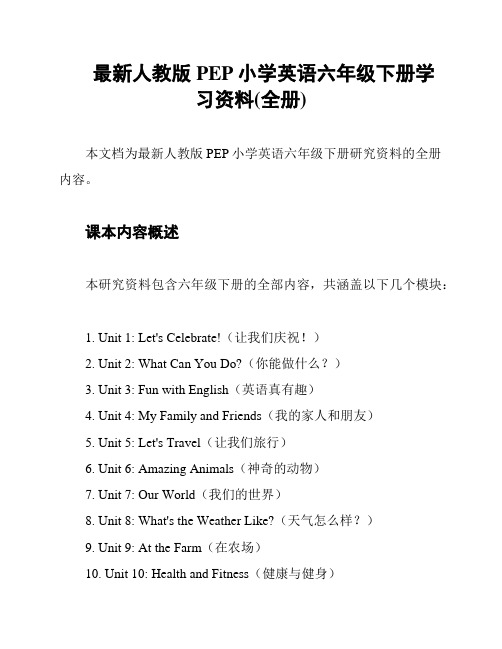
最新人教版PEP小学英语六年级下册学习资料(全册)本文档为最新人教版PEP小学英语六年级下册研究资料的全册内容。
课本内容概述本研究资料包含六年级下册的全部内容,共涵盖以下几个模块:1. Unit 1: Let's Celebrate!(让我们庆祝!)2. Unit 2: What Can You Do?(你能做什么?)3. Unit 3: Fun with English(英语真有趣)4. Unit 4: My Family and Friends(我的家人和朋友)5. Unit 5: Let's Travel(让我们旅行)6. Unit 6: Amazing Animals(神奇的动物)7. Unit 7: Our World(我们的世界)8. Unit 8: What's the Weather Like?(天气怎么样?)9. Unit 9: At the Farm(在农场)10. Unit 10: Health and Fitness(健康与健身)每个单元都包含了字母、语音、词汇、句型、对话和练等内容,旨在帮助学生提高英语听、说、读、写的能力,并通过丰富多样的主题培养学生的兴趣和研究动力。
研究资料特点最新人教版PEP小学英语六年级下册研究资料有以下几个特点:1. 简明扼要:研究资料使用简明扼要的语言,减少了不必要的复杂性,并避免了法律上的纠纷。
2. 结构清晰:每个单元的内容都按照统一的结构进行组织,以便学生更好地理解和记忆。
3. 实用性强:研究资料的内容贴近实际生活,帮助学生学会运用英语进行日常交流。
4. 提高研究动力:研究资料以多样的主题和有趣的活动形式激发学生的研究兴趣。
学生可以通过使用本研究资料,系统地研究、巩固和扩展各个单元的知识和技能,提高英语水平。
使用指导学生可以按照以下步骤使用本研究资料:1. 阅读课本内容:认真阅读每个单元的课本内容,理解字母、语音、词汇、句型和对话等基础知识。
(完整版)新版PEP小学小学六年级下册知识点总结

(完整版)新版PEP小学小学六年级下册知识点总结六年级英语下册知识点梳理Unit 1 How tall are you?一、单元内容简析:本单元内容的中心话题是询咨询人或事物的年龄、身高、分量以及长度并作比较。
内容涉及恐龙、猴子以及鲸类的比较,学生之间在年龄、身高和体重方面的比较。
三、本单元难点:1、数字的读法,含有“厘米、千克”单位的读法。
如百以上164:one hundred and sixty-four,学生也许读的时候百后别知加“and”,还有千的读法:thousand,小数的读法等。
2、形容词比较级的用法与变化形式,哪些要双写,哪些要把y变i成再加er,到底在啥事情下变比较级要加上more。
3、代词的用法,特殊是名词性物主代词的用法。
四、易考点与易错点:1、词语类:①四会词语在听力部分听写或笔试部分按照汉意写词语。
②按要求写词语:变比较级funny,heavy,big,thin;long的名词,foot,tooth复数,heavy(heavier)的反义词light(er)③very修饰原级,much修饰比较级。
例如:He is very tall. He is much taller than you.2、语法、句型类:①How引导的别同特别疑咨询句:How be sb.?(咨询某人状况),Howtall/heavy/old be sb./sth?(询咨询身高、体重、年龄)How long/big/large be---?(咨询多长、多大)How many/much(咨询数量、价格)。
②比较级的运用,一定要是相同内容或类不才能够举行比较,这是学生最易出错和混淆娥地点。
例如:Mike’s legs are longer than (John),假如学生翻译会直截了当填写John,然而一分析就别难发觉应该和John的腿作比较的,因此应该是John’s。
再比如My hair is longer than (she).假如别认真分析大多数学生都会错填成:she,her,然而填hers才是正确的。
2019-2020学年度最新PEP人教版小学六年级英语下册:小学英语毕业考试总复习资料(小升初精品资料)

2019-2020学年度最新PEP人教版小学六年级英语下册:小学英语毕业考试总复习资料(小升初精品资料)一、26个字母:(要求会默写字母的大小写、连续听音书写字母、按顺序排列字母或单词)26个字母:Aa Bb Cc Dd Ee Ff Gg Hh Ii Jj Kk Ll Mm Nn Oo Pp Qq Rr Ss Tt Uu Vv Ww Xx Yy Zz元音字母:A a , Ee, Ii, Oo, Uu二、语音知识:Aa name名字cake蛋糕gate大门cage鸟笼snake蛇face脸baby娃娃apple苹果cat猫bag书包hat帽子fat胖的Ee(ee,ea)these 这些three三sheep绵羊knee膝盖tree树beans豆角egg蛋elephant大象desk课桌bed 床pen钢笔leg 腿Ii five 五nine九like 喜欢kite风筝bike 自行车fish鱼big大的six小的milk牛奶is是it 它this 这个Oo(oa,oe)nose 鼻子those那些bone骨头toe 脚趾头goat山羊boat船coat 大衣dog 狗fox狐狸frog 青蛙box盒子hot 热的not不是bus 公共汽车umbrella 雨伞uncle 叔叔Cc CD 光盘circle 圆形cent 分钱cat 猫camera 照相机Gg(ge)orange 桔子giraffe 长颈鹿page 页frog 青蛙girl 女孩big 大的gate 大门th thin 瘦的three 三thirteen 十三mouth 嘴mother 妈妈father 爸爸brother 兄弟they 他们this 这个that 那个feather 羽毛wh what 什么when 什么时候where 哪里why 为什么which 哪一个white 白色的water水woman 女人walk 走who 谁whose 谁的ar car 汽车park 公园farm 农场arm手臂star星星ir girl 女孩bird 鸟nurse护士purse 钱包turtle 海龟third第三hurt 疼ow cow奶牛owl 猫头鹰house 房子mouse 鼠,鼠标cloudy多云的oy oi boy 男孩toy 玩具oyster 贝壳oil 油coin 硬币boil 沸腾or/oor horse 马store 商店corn 玉米door 门floor 地板air ear chair 椅子hair 头发pear 梨bear 熊oo book 书good 好的look 看foot 脚moon 月亮food 食物pool 池子room房间字母s或es的发音:字母s在词首发音为/s/, 在中间如:usually, television, treasure, casual中发音为/ /;以/p/, /t/, /k/ 清音收尾,读音为/s/;其他情况一般读音为/z/;以s, x, ch, sh 收尾加es的,es读音为/iz/。
人教版英语六年级下册知识点总结
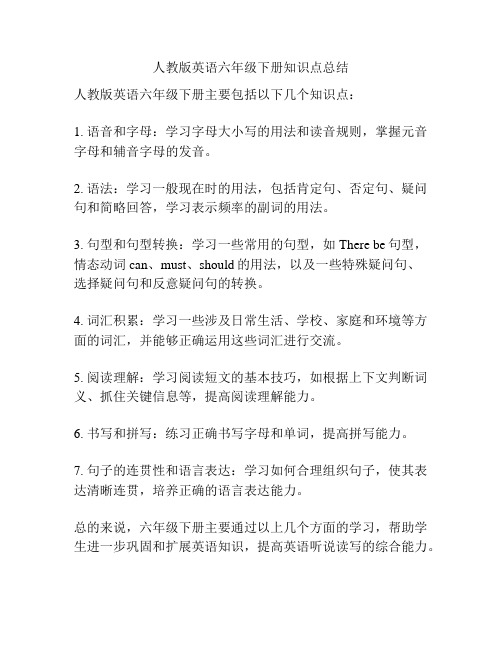
人教版英语六年级下册知识点总结
人教版英语六年级下册主要包括以下几个知识点:
1. 语音和字母:学习字母大小写的用法和读音规则,掌握元音字母和辅音字母的发音。
2. 语法:学习一般现在时的用法,包括肯定句、否定句、疑问句和简略回答,学习表示频率的副词的用法。
3. 句型和句型转换:学习一些常用的句型,如There be句型,情态动词can、must、should的用法,以及一些特殊疑问句、
选择疑问句和反意疑问句的转换。
4. 词汇积累:学习一些涉及日常生活、学校、家庭和环境等方面的词汇,并能够正确运用这些词汇进行交流。
5. 阅读理解:学习阅读短文的基本技巧,如根据上下文判断词义、抓住关键信息等,提高阅读理解能力。
6. 书写和拼写:练习正确书写字母和单词,提高拼写能力。
7. 句子的连贯性和语言表达:学习如何合理组织句子,使其表达清晰连贯,培养正确的语言表达能力。
总的来说,六年级下册主要通过以上几个方面的学习,帮助学生进一步巩固和扩展英语知识,提高英语听说读写的综合能力。
人教精通版2019-2020学年六年级英语第二学期全册知识点归纳与整理

人教精通版2019-2020学年六年级英语第二学期全册知识点归纳与整理Unit IwenttoSanyaformyholidays.一、核心词汇1.名词sun太阳moon月亮star星星blackboard黑板subject学科word单词;词lesson课yesterday昨天2.动词learn学习say说use用3.其他but但是why为什么4.短语byplane乘飞机atnight晚上athome在家里alotof很多二、了解词汇短语gotothebeach去沙滩enjoysunbathing享受日光浴enjoythemoonandstars看月亮和星星stayathome待在家里haveaparty聚会enjoySpringFestival过春节listentoEnglish听英语speakEnglish讲英语readEnglish读英语writeEnglish写英语talkinEnglish用英语交谈playinEnglish用英语玩游戏dotasks做任务haveanEnglishparty举办英语聚会actindrama表演戏剧learnfromeachother互相学习三、核心句型1.—Whatdidyoudoduringyourholidays?假期你做了什么?—IwenttoSanyawithmyparents.我和我的父母一起去了三亚。
解读:这是一般过去时的特殊疑问句。
举一反三:—Whatdidyoudoyesterday?昨天你做了什么?—Iwenttothehospital.我去医院了。
2.—Howdidyougetthere?你怎样到的那里?—Wewenttherebyplane.我们乘飞机去的。
解读:how的意思是“怎样”,可以提问交通方式或做某件事的方法等。
举一反三:—Howdidyougotoschool?你怎样去上学?—Iwenttoschoolonfoot.我步行去学校。
(人教PEP)六年级英语下册复习资料 全册句型总结
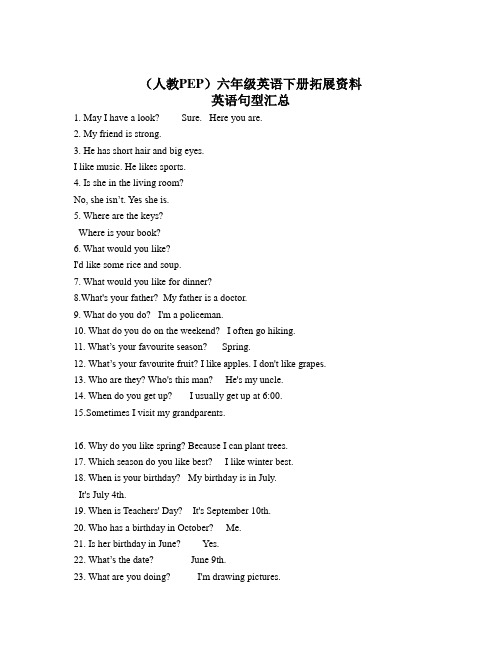
(人教PEP)六年级英语下册拓展资料英语句型汇总1. May I have a look? Sure. Here you are.2. My friend is strong.3. He has short hair and big eyes.I like music. He likes sports.4. Is she in the living room?No, she isn’t. Yes she is.5. Where are the keys?Where is your book?6. What would you like?I'd like some rice and soup.7. What would you like for dinner?8.What's your father? My father is a doctor.9. What do you do? I'm a policeman.10. What do you do on the weekend? I often go hiking.11. What’s your favourite season?Spring.12. What’s your favourite fruit? I like apples. I don't like grapes.13. Who are they? Who's this man? He's my uncle.14. When do you get up? I usually get up at 6:00.15.Sometimes I visit my grandparents.16. Why do you like spring? Because I can plant trees.17. Which season do you like best? I like winter best.18. When is your birthday? My birthday is in July.It's July 4th.19. When is Teachers' Day? It's September 10th.20. Who has a birthday in October? Me.21. Is her birthday in June? Yes.22. What’s the date? June 9th.23. What are you doing? I'm drawing pictures.24. What is your father doing? He's writing an e-mail.25. What do you see? I see two elephants.26. What are they doing? They are drinking water.27. What is Mike doing? He's watching insects.28. Where are they? They are in the woods.29. Are they catching butterflies? No, they aren't.30. They are picking up leaves. Yes, they are.31. Where is Zhang Peng? He's in the woods.32. Is he taking pictures? Yes, he is. No, he isn't. He's playing chess.33. who’s your English teacher?Mr. Carter.34. What’s he like? He's tall and strong.35. Is he quiet? No, he isn't. He's very active.36. What day is it today? It's Wednesday.37. What do you have on Thursdays?We have English, math and science on Thursdays.38. What do you do on Saturdays?I watch TV on Saturdays.39. What do you have for lunch on Mondays?We have tomatoes, tofu and fish.40. What can you do? I can sweep the floor.41. Can you make the bed? NO, I can't. Yes, I can42.There are two bedrooms, a kitchen, a bathroom and a living room.43. There is a mirror, a bed and a big closet.44. Is there a forest in the park?Yes, there is. No, there isn't.45. Are there any pandas in the mountains?No, there aren't.46. Are there any fish in the rivers?Yes, there are.47. Where is the canteen?It's on the first floor.48. What time is it?It's 5 o'clock. It's 6:30.49. It’s time to go to school.It's time for English.50. What colour is it? It's blue.51. Whose is it? It's my T-shirt.52. What’s the weather like in Beijing?It's rainy today.53. who’s that woman? She's my mother.54. Do you like peaches? Yes, I do. No, I don't.55. Nice to meet you. Nice to meet you, too.56. I have a bear. May I have a look? Sure. Here you are.57. Where is the cinema? It's next to the hospital.58. Turn left at the cinema, then go straight.It's on the left.59. What are you going to do on the weekend?I'm going to visit my grandparents this weekend.60. Where are you going this afternoon?I'm going to the bookstore.61. What are you going to buy?I'm going to buy a comic book.62.What's your hobby? I like collecting stamps.63. Does she teach English?No, she doesn't. Yes, she does.64. What does your mother do? She is a TV reporter.65. Where does she work? She works in a car company.66. What should you do then?。
人教pep版六年级英语下册知识点归纳总结

人教pep版六年级英语下册知识点归纳总结英语学习是初中阶段的重要课程之一,六年级下册是英语学习的最后一个阶段。
为了帮助同学们复习和总结这一阶段所学的知识点,本文对人教PEP版六年级英语下册的内容进行归纳总结。
Unit 1: What's your hobby?本单元主要围绕爱好展开,重点句型包括:1. What's your hobby? My hobby is…2. I like collecting stamps/playing soccer, etc.3. What do you often do on weekends?4. Do you like…? Yes, I do./No, I don't.在学习过程中,同学们需要学会用正确的句子结构来描述自己的爱好,并学会询问别人的爱好。
Unit 2: What's the matter?本单元主要学习有关健康和日常疾病的表达方式,重点句型包括:1. What's the matter with you?2. I have a headache/toothache…3. You should see a doctor.4. Take some medicine.通过本单元的学习,同学们能够学会询问他人的健康状况并给予适当的建议。
Unit 3: Where did you go on vacation?本单元主要学习有关旅行的词汇和句型,重点句型包括:1. Where did you go on vacation?2. I went to…3. How did you go?4. What did you do there?通过本单元的学习,同学们能够学会用过去式来描述自己的旅行经历,并询问别人的旅行经历。
Unit 4: How do you study for a test?本单元主要学习有关学习方法和考试准备的表达方式,重点句型包括:1. How do you study for a test?2. I study by making flashcards/reading aloud, etc.3. I review by doing practice tests/asking my classmates for help.通过本单元的学习,同学们能够学会用正确的方式来进行考试的准备,并学会向他人询问学习方法。
(直打版)新人教版(PEP)小学英语六年级下册各单元知识点总结

(直打版)新人教版(PEP)小学英语六年级下册各单元知识点总结(word版可编辑修改)编辑整理:尊敬的读者朋友们:这里是精品文档编辑中心,本文档内容是由我和我的同事精心编辑整理后发布的,发布之前我们对文中内容进行仔细校对,但是难免会有疏漏的地方,但是任然希望((直打版)新人教版(PEP)小学英语六年级下册各单元知识点总结(word版可编辑修改))的内容能够给您的工作和学习带来便利。
同时也真诚的希望收到您的建议和反馈,这将是我们进步的源泉,前进的动力。
本文可编辑可修改,如果觉得对您有帮助请收藏以便随时查阅,最后祝您生活愉快业绩进步,以下为(直打版)新人教版(PEP)小学英语六年级下册各单元知识点总结(word版可编辑修改)的全部内容。
人教PEP版英语六年级下册各单元知识点Unit 1 How tall are you ?一.必背单词(形容词的比较级)一般形容词→词尾+ertall —— taller 更高的 short -— shorter 更矮的/更短的long —— longer 更长的 strong—— stronger 更强壮的old —— older 更老的/更旧的 young—— younger 更年轻的small -— smaller 更小的 low-— lower 更低地smart-—smarter 更聪明的以e结尾的形容词→词尾+rlarge -— larger 更大的 late —— later 更晚的simple —— simpler更简单的 safe —- safer 更舒服的以重读闭音节结尾,辅+元+辅→双写最后一个辅音字母+erbig——bigger 大的——更大的 thin——thinner 瘦的——更瘦的fat——fatter 胖的——更胖的 sad -—sadder难过的——更难过的hot-—hotter 热的——更热的 wet—-wetter 潮湿的——更潮湿的④辅音字母+y 结尾→改 y 为 i +erhappy——happier 更开心的 heavy——heavier 更重的funny——funnier 更滑稽的 angry-—angrier 更生气的sunny——sunnier 更生气的 windy-—windier 更有风的busy-—busier 更忙的 early-—earlier 更早的dinosaur 恐龙 hall 大厅 than 比 both 两个都 meter 米 kilogram 千克;公斤 size 号码 feet 脚 wear 穿 countryside 乡村 shadow 影子;阴影 become 变成;开始变得二.重点句型⑴问年龄,身高,体重等How old are you? How tall are you? How heavy are you? -—- I’m _____ (years old)。
六年级英语人教版下册知识汇总
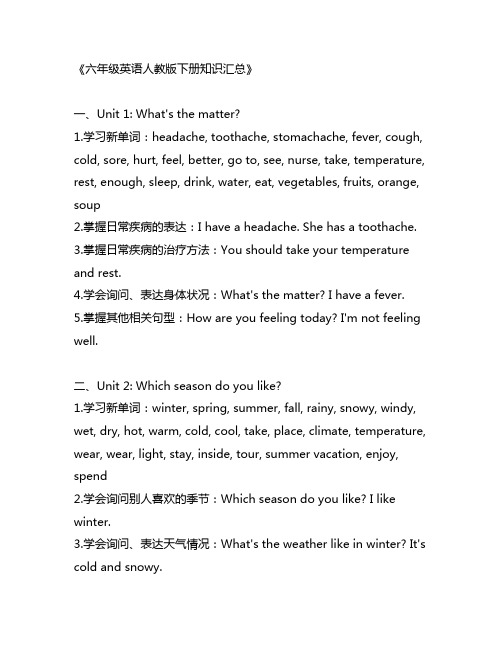
《六年级英语人教版下册知识汇总》一、Unit 1: What's the matter?1.学习新单词:headache, toothache, stomachache, fever, cough, cold, sore, hurt, feel, better, go to, see, nurse, take, temperature, rest, enough, sleep, drink, water, eat, vegetables, fruits, orange, soup2.掌握日常疾病的表达:I have a headache. She has a toothache.3.掌握日常疾病的治疗方法:You should take your temperature and rest.4.学会询问、表达身体状况:What's the matter? I have a fever.5.掌握其他相关句型:How are you feeling today? I'm not feeling well.二、Unit 2: Which season do you like?1.学习新单词:winter, spring, summer, fall, rainy, snowy, windy, wet, dry, hot, warm, cold, cool, take, place, climate, temperature, wear, wear, light, stay, inside, tour, summer vacation, enjoy, spend2.学会询问别人喜欢的季节:Which season do you like? I like winter.3.学会询问、表达天气情况:What's the weather like in winter? It's cold and snowy.4.学会描述喜欢的季节特征:I like summer because it's warm and sunny.5.学会描述自己在某个季节所做的活动:I stay inside and read in winter.三、Unit 3: What are you doing for vacation?1.学习新单词:museum, camping, hiking, zoo, beach, climb, mountain, forest, river, lake, trip, tour, visit, site, decide, activity, prepare, ready, camping, pack, tent,pass, sleeping bag, flashlight, mirror, toothbrush, toothpaste, camera2.学会询问别人在假期做什么:What are you doing for vacation? I'm camping.3.学会描述自己假期的计划:I'm climbing mountains and visiting the zoo.4.学会建议朋友假期活动:You should go hiking and visit the museum.5.掌握相关活动的动词表达:We're visiting a zoo and camping near a river.四、Unit 4: How do you get to school?1.学习新单词:bike, helicopter, skate, walk, bus, subway, train, car, taxi, boat, ship, ferry, ride, fast, foot, wear, seat, belt, important, drive, carefully, happily2.学会询问别人通常怎么上学:How do you get to school? I go to school by bike.3.学会描述自己怎么上学:I walk to school every day.4.学会询问别人怎么去某个地方:How do you get to the zoo? I go by subway.5.掌握相关交通工具的动词表达:I ride a ferry to get to the island五、Unit 5: How much is it?1.学习新单词:shopping, mall, bookstore, drugstore, toy store, shoe store, music store, price, store, sell, money, pay, spend, buy, cheap, expensive, sale, discount, Dollar, Cent, Euro, Pound, Yen, Yuan2.学会询问价格:How much is the T-shirt? It's $ 10.3.学会描述购物体验:I went to the bookstore and bought a book.4.学会询问和表达购物时的价格:The shoes are expensive. I spend $50 on theputer.5.掌握货币表达方式:How much is the dress? It's 100 yuan.六、Unit 6: I'm watching TV.1.学习新单词:play, TV,puter, video, game, chat, with, friend, alone, sometimes, air, outside, talk, on the phone, make, model, ship, airplane, kite, bird, rocket, fly, away2.学会询问别人在做什么:What are you doing? I'm playingputergames.3.学会描述自己正在做的事情:I'm watching TV and chatting with my friend.4.学会表达自己的喜好:I like playing video games and talking on the phone.5.学会表达某些特殊活动:I'm flying a kite in the park.七、Unit 7: What does she look like?1.学习新单词:young, old, have, long, short, curly, straight, blonde, hair, eyes, wear, glasses, big, small, pretty, handsome, tall, short, slim, heavy, dress, skirt, T-shirt, blouse, shirt2.学会询问看起来是什么样子:What does she look like? She is tall and slim.3.学会描述别人的外貌特征:She has long, curly hair and big eyes.4.学会询问和描述服装穿着:What is she wearing? She is wearinga skirt and a T-shirt.5.学会表达自己的外貌特征:I have short, straight hair and small eyes.八、Unit 8: How was your school trip?1.学习新单词:school trip, climb, mountain, wonder, student, teacher, guide, learn, lot, see, different, plant, animal, ground, sun, shine, sky, blue, tree, leaf, same, big, small, much, little2.学会询问和描述学校旅行的情况:How was your school trip? It was wonderful. We climbed a mountain and saw many different plants and animals.3.学会询问和表达在旅行中所见所闻:What did you see on the school trip? We saw a lot of birds and flowers.4.学会表达个人感受:It was a great experience. I learnt a lot during the school trip.5.掌握描述旅行中自然环境的单词和短语:There were many big trees and much sunshine during the school trip.九、Unit 9: When is Easter?1.学习新单词:month, year, holiday, Easter, Christmas, New Year's Day, Spring Festival, Halloween, Thanksgiving Day, Valentine's Day, Mother's Day, Father's Day, holiday, celebrate, on, in, when2.学会询问和表达节日时间:When is Christmas? It's on December 25th.3.学会介绍和讨论节日习俗:We celebrate Thanksgiving Day on the fourth Thursday of November.4.学会描述不同节日习俗:We give presents on Valentine's Day.5.学会对不同节日的预祝:Happy New Year! Happy Mother's Day!结语:以上是六年级英语人教版下册知识的汇总总结,通过对每个单元内容的梳理和归纳,可以更好地帮助学生系统地学习和掌握相关知识,在英语学习过程中取得更好的学习效果。
2019-2020年人教版PEP小学英语六年级知识要点及习题总复习讲义

2019-2020年人教版PEP小学英语六年级知识要点及习题总复习讲义名词复数规则1.一般情况下,直接加-s,如:book-book s,bag-bag s,cat-cat s,bed-bed s2.以s.x.sh.ch结尾,加-es,如:bus-bus es,box-box es,peach-peach es, watch-watch es3.以“辅音字母+y”结尾,变y为i, 再加-es,如:famil y-famil ies, strawberr y-strawberr ies4.以“f或fe”结尾,变f或fe为v, 再加-es,(但有一个特例:roof→roofs)。
如: kni fe-kni ves lea f-lea ves wife-wivesthief-thieves wolf-wolves5.以“o”结尾的单词,如果有生命,加-es;如果没有生命,加-s。
如:①有生命:potato-potato es tomato-tomato esmango-mango es(芒果)hero-hero es(英雄) Negro- Negro es (黑人)②没生命:radio-radio s piano-piano s photo-photo szoo-zoo s6.不规则名词的复数变化:(一)完全不规则:m a n-m e n woman-women policeman-policemenpolicewoman-policewomen mouse-mice child-children f oo t-f ee t tooth-teeth goose-geese(二)单数复数同形:fish-fish sheep-sheep deer-deerpeople-peopleChinese-Chinese Japanese-Japanese 小练习:写出下列各词的复数I _______ him ______ this ______ her ______ watch _______ child ______ photo ______ diary______day______foot_______ book______ dress _____tooth______ sheep ______box_____ strawberry ________ leaf ____ potato ______ peach______ bus ______ man______ woman______ paper_______ juice______ water________ milk________ rice__________ tea__________一般现在时态一般现在时基本用法介绍1.一般现在时的功能1).表示事物或人物的特征、状态。
人教PEP版2019-2020学年六年级英语下学期全册单元知识点复习资料

Unit 1 How tall are you?重点词汇:1、Younger 更年轻的young的比较级young 的最高级?例句:我的妈妈比爸爸更年轻。
2、older 更年长的old的比较级old的最高级?elder eldest 例句:汤姆比吉姆更年长。
3、taller 更高的tall 的比较级tall的最高级?例句:我比我的弟弟高。
4、shorter 更矮的,更短的short的比较级,short的最高级?例句:这把尺子比那把尺子短。
5、longer 更长的long的比较级例句:她的头发比我的长。
6、thinner 更瘦的thin的比较级反义词?例句:这只猴子比大象瘦7、heavier 更重的heavy的比较级反义词?例句:迈克比他妹妹更重。
8、bigger 更大的big的比较级反义词?例句:这只兔子比那只兔子大的多。
This rabbit is much bigger than that one .9、smaller 更小的small 的比较级例句:我的梨子比你的小。
My pear is smaller than yours.10、strong 更强壮的strong的比较级反义词?例句:我哥哥比我强壮。
11、countryside n. 不可数名词乡村同义词:例句:我的祖父母生活在一个小乡村。
12、lower 更低的low的比较级反义词?例句:这栋楼比那栋楼低。
This building is lower than that one.13、shadow n. 可数名词阴影,影子例句:你能看到你的影子吗?14、smarter 更聪明的smart的比较级例句:你变得越来越聪明了。
You are getting smarter and smarter.15、become v. 开始变得,变成例句:这个女孩想成为一名演员。
This girl wants to become an actress.重点短语:How tall 多高how heavy 多重how old 多大what size 多大号In this hall 在这个厅里both of 两个都over there 在那边have a look 看一看Go down 下降重点句型:①形容词的最高级:最高级通常用于3人或者3人以上的人或事物之间的比较。
2019-2020学年度人教版PEP六年级下册整本预习资料全汇总

人教版PEP六年级下册整本预习资料全汇总第一单元一、单词young—younger更年轻的old-older更年长的tall-taller更高的short-shorter 更矮的long-longer更长的thin-thinner更瘦的heavy-heavier更重的big-bigger更大的small-smaller更小的strong-stronger更强壮的二、句子1.That's the tallest dinosaur in this hall.那是这个厅里最高的恐龙。
2.You're older than me.你比我大。
3.How tall are you?你有多高?I'm1.65meters.我身高1.65米。
4.What size are your shoes?你穿多大号的鞋。
5.My shoes are size37.我穿37号的鞋。
6.Your feet are bigger than mine.你的脚比我的大。
7.How heavy are you?你有多重?8.I'm48kilograms.我体重48公斤。
三、语法复习要点形容词的比较级1、形容词比较级在句子中的运用:两个事物或人的比较用比较级,比较级后面一般带有单词than。
than后的人称代词用主格(口语中可用宾格)。
2.形容词加er的规则:⑴一般在词尾加er;⑵以字母e结尾,加r;如:nice---nicer⑶以一个元音字母和一个辅音字母结尾,应双写末尾的辅音字母,再加er;如:big---bigger thin----thinner⑷以“辅音字母+y”结尾,先把y变i,再加er。
heavy----heavier3.不规则形容词比较级:good/well-better例句:(1)It's tall er than both of us together.它比我俩加起来还高。
(2)Your feet are bigger than mine.你的脚比我的大。
- 1、下载文档前请自行甄别文档内容的完整性,平台不提供额外的编辑、内容补充、找答案等附加服务。
- 2、"仅部分预览"的文档,不可在线预览部分如存在完整性等问题,可反馈申请退款(可完整预览的文档不适用该条件!)。
- 3、如文档侵犯您的权益,请联系客服反馈,我们会尽快为您处理(人工客服工作时间:9:00-18:30)。
Unit 1 How tall are you?重点词汇:1、Younger 更年轻的young的比较级young 的最高级?例句:我的妈妈比爸爸更年轻。
2、older 更年长的old的比较级old的最高级?elder eldest 例句:汤姆比吉姆更年长。
3、taller 更高的tall 的比较级tall的最高级?例句:我比我的弟弟高。
4、shorter 更矮的,更短的short的比较级,short的最高级?例句:这把尺子比那把尺子短。
5、longer 更长的long的比较级例句:她的头发比我的长。
6、thinner 更瘦的thin的比较级反义词?例句:这只猴子比大象瘦7、heavier 更重的heavy的比较级反义词?例句:迈克比他妹妹更重。
8、bigger 更大的big的比较级反义词?例句:这只兔子比那只兔子大的多。
This rabbit is much bigger than that one .9、smaller 更小的small 的比较级例句:我的梨子比你的小。
My pear is smaller than yours.10、strong 更强壮的strong的比较级反义词?例句:我哥哥比我强壮。
11、countryside n. 不可数名词乡村同义词:例句:我的祖父母生活在一个小乡村。
12、lower 更低的low的比较级反义词?例句:这栋楼比那栋楼低。
This building is lower than that one.13、shadow n. 可数名词阴影,影子例句:你能看到你的影子吗?14、smarter 更聪明的smart的比较级例句:你变得越来越聪明了。
You are getting smarter and smarter.15、become v. 开始变得,变成例句:这个女孩想成为一名演员。
This girl wants to become an actress.重点短语:How tall 多高how heavy 多重how old 多大what size 多大号In this hall 在这个厅里both of 两个都over there 在那边have a look 看一看Go down 下降重点句型:①形容词的最高级:最高级通常用于3人或者3人以上的人或事物之间的比较。
表示“三个或者三个以上中最...的”例句:莉莉是这个小组里最矮的女孩。
Lily is the shortest girl in this team.注意:在句子中,形容词最高级前通常加the.②辨析both 与allboth-“两个都”all-“所有,全部”(三者或三者以上都...)例句:两位男士都是中国人。
Both of the men are Chinese.他们都喜欢那场聚会。
All of them enjoyed the party.③如何比较两个事物句式:A+be动词+形容词比较级+ than +B拓展:如果比较两个人或事物,在具体数值上的差距时,如:短2厘米,大3岁,如何表达?句式:A+be动词+具体的差距+形容词比较级+than+B例句:我比我的妹妹高5厘米I am 5cm taller than my sister.你比吉姆小一岁You are one year younger than Jim.④如何询问高度提问:How tall + be动词+主语?回答:主语+be动词+数字+单位长度例句:你姐姐有多高?How tall is your sister?她身高1.7米。
She is 1.7 metres tall.⑤选择疑问句Do you like apples or pears ? I like apples.⑥形容词比较级变化规则⑦如何询问服装,鞋子等尺码提问: What size is/are+...服装,鞋子回答: Size+数字例句:你穿多大号的衬衫?What size is your shirt?回答:41,42号 Size 41 , 42你姐姐穿多大号裤子? What size are your sister’s trousers?28号 size 28⑧可数名词复数形式不规则变化含有oo的单词 foot-feet tooth-teeth含有-man的单词 man-men woman-women snowman-snowmenChild-children单复数同形的 sheep-sheep Chinese-Chinese只有复数形式的 clothes trousers sunglasses⑨look 的用法(1)系动词看起来 look+adj. You look angry/happy/sad....(2)做动词看 look at please look at the blackboard.(3)have a look⑩如何询问重量?例句:你体重多少?回答:49公斤词汇:Kilogram 公斤,千克(11)’s所有格小结The girl’s dress Tom’s Dad Jim’s shoesthe girls’ dresses. The boys’ pens the babies’ dollsChildren’s toys‘s 表示有生命的物体的所有格无生命的物体所有格用of...The legs of the table The windows of the house The doors of the car(12)Story-time 重点词汇goalkeeperHave a tryHow heavyCentimetreCatch the ballTeamworkUnit 2 Last weekend重点词汇:1、cleaned clean的过去式词组:打扫房间cleaned the room擦桌子cleaned the table擦窗户cleaned the window.我今天早上打扫卧室了。
I cleaned the bedroom this morning.2、washed wash的过去式词组:洗脸washed face洗手washed hands 洗碗washed the dishes 洗衣服washed the clothes昨晚他洗衬衫了。
He washed the shirts last night3、stayed stay的过去式词组:待在家stayed at home 待在床上stayed in bed我昨天待在家了。
I stayed at home yesterday.4、watched watch的过去式词组:看电视watched TV 看电影watched a film 仔细看watched carefully迈克昨天看电视了。
Mike watched TV yesterday.5、last adj. 最近的;上一个的词组:去年,last year上周last week你昨晚做什么了?What did you do last night?6、yesterday adv. 昨天词组:昨天上午yesterday morning 昨天晚上yesterday evening 前天the day before yesterday我昨天去了公园。
I went to the park yesterday.7、before prep. 在...之前反义词?after 在。
之后注意:before既可以表示时间的在。
之前,也可以表示空间位置上的在,,,前面饭前要洗手。
Wash your hands before meals.我六点前吃早饭。
I have breakfast before 6:00.迈克坐在李雷前面。
Mike sits before LI Lei.8、read read的过去式词组:读书read a book 看报纸read a newspaper迈克昨天读书了。
Mike read a book yesterday.9、saw see的过去式词组:看电影saw a film.我昨晚看了一部电影。
I saw a film last night.10、slept sleep的过去式反义词?汤姆前天在沙发上睡的觉。
Tom slept on the sofa the day before yesterday.11、hotel n. 旅馆12、fixed fix的过去式迈克很快地修理了他的小汽车。
Mike fixed his car quickly.昨天他修理了一台机器。
He fixed a machine yesterday.近义词:repaired13、broken adj. 破损的短语:一把破损的椅子 a broken chair坐在破损的椅子上很危险。
It is very dangerous to sit on a broken chair.这个漂亮的花瓶裂了。
This beautiful vase is broken.14、lamp n. 台灯请打开台灯。
Please turn on the lamp turn off 关掉书桌上有一盏台灯。
There is a lamp on the desk.Story time 重点词汇busy adj. 忙碌的Went go的过去式短语:去钓鱼go fishingVisited visit的过去式Need v. 需要短语:需要帮助need helpAnother 另一个;有一个;再一个重点短语:打扫房间踢足球洗衣服呆在家喝茶看电视去书店看电影谈论感冒读书去划船go boating铺床make the bed 做饭cook the food过去的时间:上周末last weekend 昨天晚上上周一前天重点句型:1、如何询问对方周末过得怎么样你周末过得怎么样?-How was your weekend?--It was OK/pretty good/great.--Not so good/terrible上周末迈克的爷爷做什么了?What did Mike’s grandfather do last weekend?上周末你做什么了?What did you do last weekend?下周末你打算做什么?What are you going to do next weekend?2、详解一般过去时一般过去时表示过去某个时间发生的动作或存在的状态,场合表示过去的时间状语连用。
例如:yesterday, the day before yesterday, st...,this morning, three days ago, ten years ago, in the past(在过去),in 2000,When I was a child...(当我小的时候),When I was five, long long ago(很久很久以前)....Just now(刚才)基本句型结构一:主语+be动词(was/were)+其他基本句型结构二:主语+动词的过去式+其他例句:昨天我在家。
